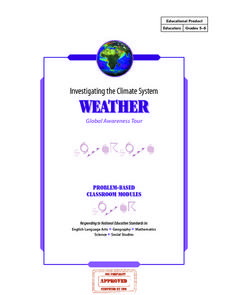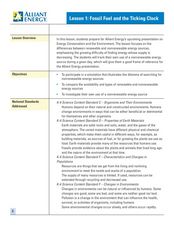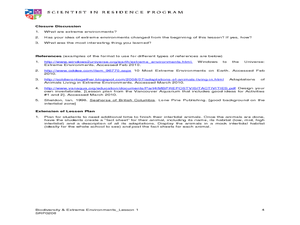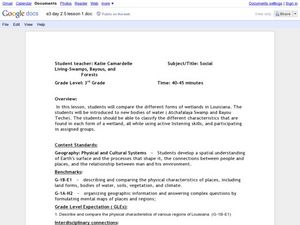Curated OER
Wetlands Are Wonderful
Students study the characteristics of wetlands. They are introduced to terms and different examples of wetlands. The hands-on activity reinforces the different parts of the wetlands, and provides a working model of a wetland.
Curated OER
What Lives in Water?
Students learn about a variety of sea creatures. They look at sea creatures pictures and identify the creatures by name and by their unique characteristics. Phonemic Awareness skills are reinforced using the beginning sounds of the...
Curated OER
Investigating the Climate System WEATHER
Young scholars research, interpret, and become able to explain general characteristics of weather in tropical regions. Students observe and compare tropical and mid-latitude weather patterns.
Curated OER
Ocean Impacts of an El Nino Event
Young scholars study sea surface height and temperature and other characteristics of an El Nino. In this ocean impacts lesson students examine the factors that influence an El Nino or La Nina.
Curated OER
Reptiles and Amphibians
Introduce your class to various reptiles and amphibians. They will meet and identify a representative from each of the four major reptile families, then learn about and discuss reptile characteristics. Next, they will identify and...
Earth Day Network
The Neolithic Revolution
With the abundance of food products we can easily access in our society today, it is easy to forget the toll this can take on our global environment. Young learners will discover how the transition to agriculture and domesticated living...
Curated OER
Exploring Biomes Lesson 1: Mapping Biomes
Environmental science learners examine satellite imagery of temperature, vegetation, precipitation, and productivity. They use these maps to understand how scientists divide the planet into major biomes. As part of a larger unit on...
Curated OER
Blue Crabs - The Blue Crab's Chesapeake Journey
A plethora of information about the blue crabs of Chesapeake Bay will amaze and delight your marine biologists. They learn, through direct instruction, about the characteristics and life cycle of this fascinating arthropod. A highlight...
Curated OER
Bering Sea Buffet - A Foodweb Activity
Life in the Bering Sea, food webs, and the ocean ecosystem are introduced with a map activity. The lesson starts as kids explore maps and images of the Bering Sea, then it kicks into high gear as they start to discuss the types of...
National Science Teachers Association
Hop into Action
Young scientists find out what makes amphibians such unique and interesting animals in this simple life science lesson. After looking at pictures and discussing the characteristics of amphibians, learners complete a series of three Venn...
It's About Time
Diversity in Living Things
How diverse is the world we live in compared to the way things used to be? Young biologists explore diverse organisms and relate the structure of each organism to its ability to survive in our current environmental conditions....
Rainforest Alliance
My Forest or the Rainforest?
The differences between tropical and temperate rainforests range from animals and flowers to climate and landscapes. Kindergarteners compare and contrast characteristics of their local forest to a tropical rainforest.
Georgian Court University
Introduction to Marsh Ecology
Compare and contrast the characteristics of fresh and salt water marshes. After exploring the typical plants and animals found in each marsh type, participants use a set of flash cards to sort into fresh and salt water marsh life. Their...
Kenan Fellows
Industrial Knowledge of Acids and Bases
Over a 10-year period, EPA regulations cost businesses less than $30 billion, while businesses saved over $82 billion. Scholars experiment with acids and bases to better understand the pH scale. Then they debate environmental regulation...
Curated OER
pH Potential
Students experiment to determine the positive and negative impacts of human activities on environmental change. They examine how physical and biological processes such as decomposition affect soil characteristics while looking at the pH...
Curated OER
Fossil Fuel and the Ticking Clock
Young scholars study energy sources to learn about fossil fuels and environmental concerns. In this energy sources lesson, students watch demonstrations for various energy examples. Young scholars find hidden pennies, make a bar graph on...
Curated OER
Wetland Wonders
Students study the characteristics of wetlands, and their importance to humans and wildlife.
Curated OER
Minnesota Ospreys and Migration
Pupils explore the route that Minnesota ospreys follow during spring and fall migration. They describe the important ecological characteristics of the places that ospreys pass through during their migration. They determine where ospreys...
Curated OER
Extreme Environments
Students examine extreme environments and the characteristics that make them. In this adaptation lesson students see how animals have adapted to these environments.
Curated OER
Living Swamps, Bayous and Forests
Third graders explore interesting environments by exploring Louisiana. In this wetland lesson, 3rd graders utilize the web to research the State of Louisiana, the bayous in the area, and the Gulf of Mexico. Students write a journal entry...
Curated OER
New Hampshire and the Five Themes of Geography
Students explore the location, place, human-environmental interactions, movement, and regions of the New Hampshire landscape through the use of visual representations.
Curated OER
Coming to Terms
Students explore the rainforest. In this environmental instructional activity, students work in small groups to conduct online research of various topics having to do with the rainforest. The groups construct a large poster to illustrate...
Curated OER
Environmental Harmony
Students use information from a variety of media to evaluate different artists' views on the human relationship to nature. From these sources, class discussion, and personal experience, students will synthesize a thoughtful,...
Curated OER
Butterfly 1: Observing the Life Cycle of a Butterfly
Pupils observe and identify the characteristics of the life cycle of a butterfly.

























